Meet the ASUS RT-AX88U - one of the first commercially available routers with support for draft of the fastest standard 802.11ax, which promises a fantastic speed for wireless connectivity
Introduction
The first router ASUS RT-AX88U was announced more at IFA 2017, but to hit store shelves until the end 2018 of the year, and that this is not all. The Russian ASUS website until even pages with RT-AX88U no description. Formally, the new standard certification 802.11ax, or, according to the new classification, Wi-Fi 6, It started only this year. AND, as always happens, for access points decision at the very least have, but the client devices have to wait and wait, so that even a test is not the first time it is necessary to return to the circuit with two routers, one of whom works in the media bridge mode. All this, however, does not interfere with marketers of all companies are actively talking about the benefits of Wi-Fi 6. true, omitting some details and bringing to the fore, of course, "Pure" speed wireless connections: to 287 Mbit / s per channel in the range 2,4 GHz and up 1201 Mbit / s per channel 5 GHz. In the case of quad ASUS RT-AX88U this can be attributed to new product marketing class AX6000: 1148 + 4804 Mbit / s. However, otherwise RT-AX88U is no different from the other top models of ASUS routers.
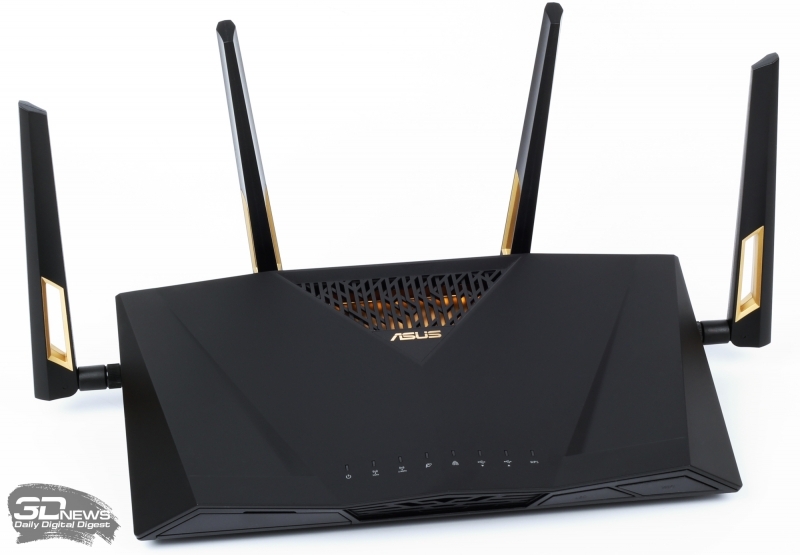
Continuity can be traced throughout the, from exterior. Wide wedge-shaped body with large, sharp edges on the top cover is made from black plastic. he brushed, although it does not protect against fingerprints and dust - they are still clearly visible. On the front bevel centrally located ventilation grille. On the left side of it is visible flip lid, behind which hides a USB port 3.0, and on the right there are two large buttons. One need to quickly turn off wireless network, and the second off LED-indicators on the top cover. Although the display here and so is not very persuasive: LEDs are too bright. All of them are milky white, and a WAN-link indicator is able to turn red if you have problems. The top cover has a pair of slits and a rather big notch zareshochenny, subtended by a large metal plate with gold shimmer.
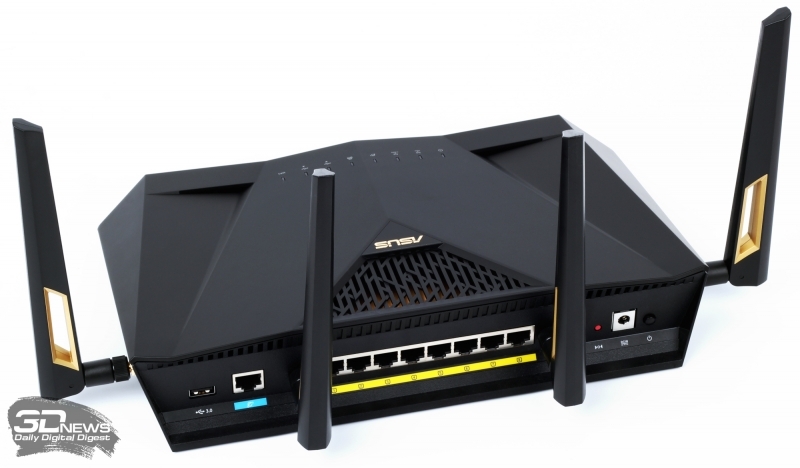
On the sides and at the rear, too, there is a small vent slits, well, and the bottom is a continuous ventilation grille. leg design is, that the device is always elevated above the surface by an average of half a centimeter. obviously, this is done with an ulterior motive - the router while working noticeably heats up. Integrated sensors indicate temperatures 60 SoC ° C to and about 50 ° C for radios idle, and under load, these figures rise. maybe, vertical mount enclosure to the wall, which is then provided, would be more optimal, than the classical installation anywhere on the table, since natural ventilation, in theory, will be better. But in this case it will be a question of convenience, the cable access, because all other ports are brought to the rear wall: Eight Gigabit LAN-Port, one WAN-port, another USB port 3.0, BP nest. Immediately and a standard set of three buttons: power switch, reset, launch of WPS.
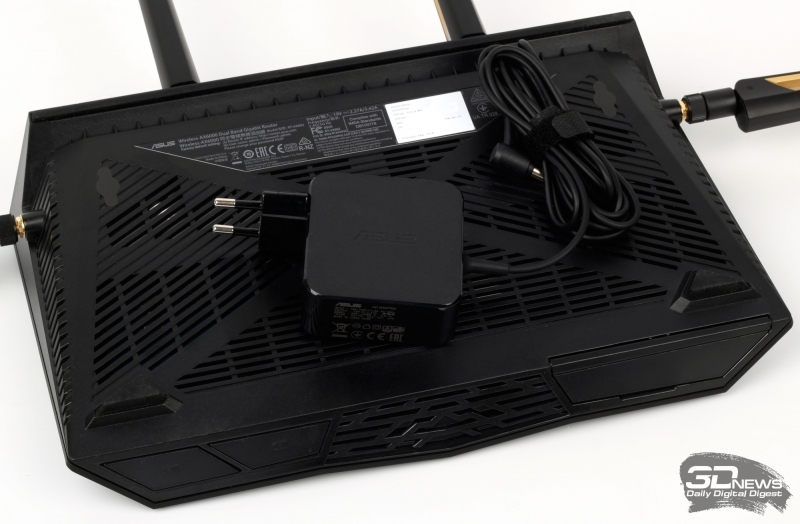
Housing dimensions approximately equal 30 × 17 × 6 cm. Add to that five-centimeter remote mount antennas on the sides and rear, as well as the length of the antenna itself 17 cm. you feel sweep? Despite the dimensions, device weighs not so much - a little less than one kilogram. Seen SOHO-routers and heavier. And voracious - a complete power supply in the form of the already familiar square "cubes" with the party 63 mm and thickness 28 mm gives 45 W. In addition to BP, in a giant box buyer discovers patch cord, documentation pack, warranty card and leaflet service WTFast, which client is embedded in firmware. For more details about this highly specialized VPN-provider for the games can be found in the survey ASUS GT-AC5300. In this case, the manufacturer of all as free base provides a perpetual subscription to the service for a single device: PC or game console, eg. Generally, understand, that RT-AX88U refers to the premium series, it is possible not only thanks to the antenna with the "gold" cutouts and ASUS logo in the same color.
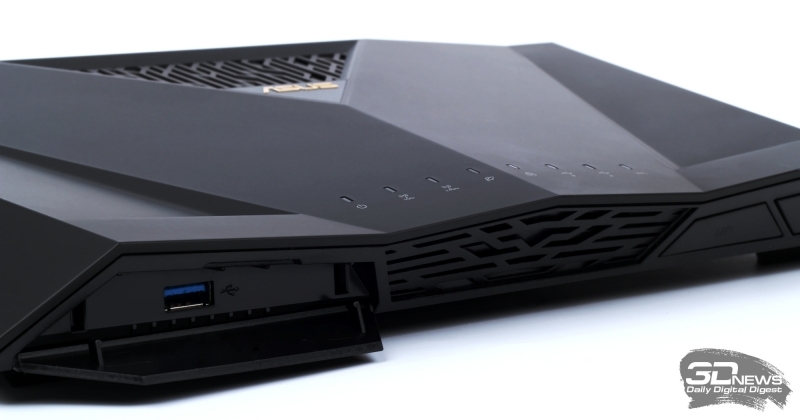
| Router ASUS RT-AX88U | |
| standard | IEEE 802.11 a/b/g/n/ac/ax (2,4 GHz + 5 GHz), 802.3ad |
| Chipset / controller | Broadcom BCM49408 (4 × ARM Cortex-B53 @ 1,8 GHz) + BCM53134 + 2 × BCM43684 |
| Memory | RAM 1024 MB / ROM 256 MB |
| antennas | 4 × external; 4×4:4; length 170 mm |
| Encryption Wi-Fi | WPA/WPA2 (Enterprise 802.1x), WPS; 6 × visited network; WDS |
| Wi-Fi settings | Speed 5 GHz: 802.11ax (5 GHz) to 4804 Mbit / s, 802.11AC до 4333 Mbit / s. |
| Speed 2,4 GHz: 802.11ax to 1148 Mbit / s up to 802.11n 1000 Mbit / s. | |
| Smart Connect, Aimesh | |
| interfaces | 9 × 10/100/1000 Mbit / s Ethernet; 2 × USB 3.0 |
| indicators | Power / Status, 2 × Wi-Fi, VAN, LAN, 2 × USB, WPS |
| hardware buttons | Nutrition, Disable Wi-Fi, reset, WPS, indicators off |
| dimensions (WxDxH) | 300 × 170 × 60 mm |
| Weight | 990 g |
| Nutrition | DC 19 AT 2,37 BUT |
| price | $350 |
| Opportunities | |
| Internet access | Static IP, DHCP, PPPoE, PPTP (MPPE), L2TP; 802.1x; USB-modem / Android-smartphone; HW / SW NAT |
| Services | DLNA server, iTunes, FTP, SMB; print-server; IPv6 (DHCP, Static, Passthrough 6to4, 6in4, 6rd); Time Machine; download manager (BitTorrent, NZB, HTTP, ED2K); AiCloud 2.0; SSH-access (password / key) |
| Protection | модуль Trend Micro Game IPS, DPI and traffic filtering, parental control, traffic blocking from infected devices, router protection; logs of visited URL; Traffic statistics for clients / protocols |
| port forwarding | Game Profile (profiles for games); Virtual Server, Port Triggering, UPnP, DMZ; IPTV (bridge, IGMP Proxy/Snooping, udpxy, VLAN) |
| VPN | client WTFast (GPN); L2TP client, PPTP, OpenVPN; PPTP server, OpenVPN |
| QoS / Shaping | Game Boost: adaptive , manual QoS, shaping by MAC; WMM |
| Dynamic DNS services | ASUS, Google Domains, DNS-O-Matic, DynDns, NO-IP, ORAY, Selfhost, Tunnelbroker, ZoneEdit; certificates Let's Encrypt |
| mode of operation | router, access point, Media Bridge; AiMesh node |
| VPN forwarding, Alarg | PPTP, L2TP, IPSec, PPPoE; H.323, RTSP, SIP |
| Firewall | Protection from DoS, SPI; MAC filtering, URL / Keyword, IP + port + protocol (TCP/UDP); IPv6: IP + port + protocol (TCP/UDP) |
Hardware novelty too close to the GT-AC5300. The "heart" of the device is SoC Broadcom BCM49408 of four 28-bit 64-nm nuclei ARM v8 Cortex-B53 at up to 1,8 GHz. By SoC for PCI-E bus 2.0 connected two identical radio BCM43684. At Broadcom is yet the most popular four-channel chip with support for Wi-Fi 802.11ax (and a / b / g / n / ac too), channels 160 MHz and 1024-QAM modulation. Besides, all in a device as a separate switch BCM53134S. Yes, yes, the story of the GT-AC5300 repeated: This switch serves the LAN ports 5/6/7/8 and with the rest of the network part is connected only gigabit link. This should be considered when using 802.3ad aggregation, which also have a router - it is marked under the LAN1 / 2 Ports. By default, it is disabled. Besides, the plans include and support the same aggregation of WAN-connection (conventional Dual-WAN, and recently there).
| Router ASUS RT-AX88U | ||||||
| The average speed of the aggregated connections, Mbit / s | ||||||
| clients | Bond → Pair × 1 | Bond → Pair × 8 | Pair → Bond × 1 | Pair → Bond × 8 | Bond ↔ Pair × 1 | Bond ↔ Pair × 8 |
| LAN 3 + 6 | 941 | 1878 | 1883 | 1887 | 3159 | 3216 |
| LAN 3 + 4 | 941 | 1872 | 1882 | 1886 | 2742 | 2977 |
| LAN 5 + 6 | 941 | 937 | 945 | 942 | 1506 | 1636 |
An important point - to distribute traffic between physical interfaces used algorithm layer3 + 4. is he, strictly speaking, not compatible with all implementations of 802.3ad, but probably, choice on his part, fell on the "fault" of some manufacturers of home NAS. Basically, this is the most obvious scenario of using Port Aggregation. maybe, developers in the future will change the algorithm or at least give users choice, because everything is regulated at the firmware level. Designated it is enough (256 MB), and there are already alternative ASUSWRT assembly - for example, by Merlin. Memory too short, although from 1 GB RAM, if you believe your monitor, Even in the simplest half is always busy. In any case, at the fantastic expansion of the functionality should not count, but all sorts of pleasant things, corrections or slightly more new features like file servers to get to them can. However, for them even sink version provides up to 100 MB / s read / write that for SMB, that for FTP. And it is unlikely for the test limit SSD Kingston SSDNow V + 200 with one volume NTFS-boxing LanShuo INIC-3609, since there probably limit the speed of a LAN-port.
| Router ASUS RT-AX88U | ||||||
| average speed, Mbit / s | ||||||
| Protocol | LAN → WAN × 1 | LAN → WAN × 8 | WAN → LAN × 1 | WAN → LAN × 8 | LAN ↔ WAN × 1 | LAN ↔ WAN × 8 |
| NAT | 943 | 949 | 884 | 948 | 1329 | 1832 |
| PPPoE | 936 | 943 | 881 | 943 | 1175 | 1043 |
| PPTP | 907 | 921 | 489 | 916 | 1070 | 963 |
| PPTP (MPPE128) | 181 | 178 | 217 | 209 | 182 | 180 |
| L2TP | 904 | 920 | 504 | 921 | 1167 | 1018 |
In general, a wired network, you can expect the same, that was in GT-AC5300. And the setting is the same - can only be manually enable Jumbo-frames. Software and hardware accelerator FASTPATH, as usual, enabled by default, with him and tests WAN-connections were made. When activated, the QoS / DPI - and the router still has the same protection system Trend Micro, and adaptive / manual traffic prioritization - is only a software accelerator, and the CPU load increases dramatically. Of any additional functions available AiMesh system, allowing fast and easy to combine modern ASUS routers into a single mesh-system to increase wireless coverage. It is very similar to the system of ASUS Lyra. Besides, from fashionable chip has support for Alexa and IFTTT, we are familiar with the example of GT-AC5300. It is important to note, RT-AX88U that just came on the market, so now actively being finalized firmware.
Settings and features ASUS RT-AX88U
But problems can arise and on the client side. Just a warning is displayed in the initial setup wizard that, that not all Wi-Fi adapters can connect to the router, and makes recommendations to install the latest drivers for them. The new standard is a normal, but is it worth the candle game? Wi-Fi 802.11ax does not require a new frequency and is backward compatible with previous standards, because it is able to work in both the ISM-band: 2,4 and 5 GHz. Formally, it is much better 802.11n / ac and there, and there. For 2,4 GHz channel width 40 can be obtained from up to 802.11n 150 Mbit / s per channel, and at 802.11ax - 287 Mbit / s "pure" speed. A similar picture for 5 GHz channel 80 MHz: 433 Mbit / s for 802.11ac and 600 Mbit / s for 802.11ax. for channels 160 MHz in this case, twice the performance in both standards - all thanks to officially entered in the modulation scheme, the standard 1024-QAM.
In reality, all manufacturers will sooner or later have added to bypass the current standards higher scheme, to give another way to promote products. The terminology Broadcom 1024-QAM scheme is called NitroQAM - in RT-AX88U for n / ac it all as relevant. But in the end the difference between Wi-Fi 802.11ac with "uluchshayzer" 802.11ax and not so great in terms of bandwidth. On a deeper level, the new standard is markedly different from the previous ones in many respects closer to modern cellular networks. It not only offers higher speeds, but also a more efficient use of spectrum and co-existence with "strangers" TD, granulation resources and work with many devices, energy efficiency and prioritization, as well as some other benefits. Although some innovations such as conditional willingness to work with the IoT is still controversial.
| Maximum speed PHY, 1 channel, Mbit / s | |||
| Wi-Fi | 40 MHz | 80 MHz | 160 MHz |
| 802.11n | 150 | – | – |
| 802.11n TurboQAM | 200 | – | – |
| 802.11n NitroQAM | 250 | – | – |
| 802.11ac | 200 | 433 | 867 |
| 802.11ac NitroQAM | 271 | 542 | 1083 |
| 802.11ax | 287 | 600 | 1201 |
All of these potential improvements are actively used in promoting routers. In this case, often only somewhere in the footnotes indicate, in practice, to get all these benefits actually required and the presence of customers with support 802.11ax. And in an ideal case should be established all the devices connected to the access point. ultra-wide channels are a separate item on the 160 MHz. In the range 5 GHz there are only two, and both fall into the zone of the DFS / TPC regulations. In simple terms, the maximum speed you can get anywhere in a private house, away from neighbors and weather radar. We do not have such conditions. In the end it turned out, stands that were redundant configuration - the second router in bridge mode, the media showed that the rate of acceptance, that the transmission in the range of anywhere from 2800 to 3700 Mbit / s. With rare departures abroad 4000, let it all and was 802.11ax mode.
stands configurations are:
- stand A: Intel Core i7-3770, 16 GB RAM, ASUS PCE-AC88, Realtek RTL8168, Windows 7 SP1 x64. Since the wireless adapter only supports 802.11n / ac and channels 80 MHz, stand actually only used to check the router compatibility with older Wi-Fi standards.
- stand R: Intel Xeon D-1540, 32 GB ECC RAM, dual-port Intel I210, dual-port Intel I350, Devuan Jessie. I350 adapter ports are used to verify the aggregation. In other tests, they are also one of the ports and I210 are connected to the first ASUS RT-AX88U, working in router mode.
- stand B: Intel Core i5-6600K, 32 Гбайт RAM Kingston HyperX Fury DDR4-3200, Intel I219-V, dual-port Intel X540-AT2, Devuan ASCII. All three network ports were used to connect to a second ASUS RT-AX88U, in bridge mode.
As for the work PCE-AC88, what with him having trouble in the range 2,4 GHz - Adapter load sooner or later simply "falling off" from the network. So that the results in the table were not obtained in a single pass. Warning about possible problems with the connection turned out to be superfluous, although for this adapter is not yet released updated drivers. On the other hand, known, that some cards from other vendors may not be connected to a new Wi-Fi. At the same time tests in 802.11ac 5 GHz can be called almost a reference, so everything was smooth with them. To test the 802.11ax separately pay attention to the, the number of threads that should be multiplied by three. In the range 2,4 GHz with a media bridge to stability problems were not, but also the benefits to 802.11n with NutroQAM on average not much. On the other hand, one another and did not promise. AT 5 GHz interesting situation: ASUS RT-AX88U is the fastest of all tested to date routers - under 2 Gbit / s wireless connection! But only tested, since other options 802.11ac@160 MHz we had.
| Router ASUS RT-AX88U | |||||||
| streams × 3 | 1 | 2 | 4 | 8 | 16 | 32 | 64 |
| Average speed Wi-Fi 802.11ax 5 GHz (160 MHz), Mbit / s | |||||||
| B -> R | 1606 | 1634 | 1633 | 1629 | 1559 | 1486 | 1453 |
| R -> B | 1588 | 1622 | 1620 | 1603 | 1586 | 1558 | 1542 |
| B <-> R | 1829 | 1824 | 1794 | 1741 | 1694 | 1662 | 1622 |
| Average speed Wi-Fi 802.11ax 2,4 GHz (40 MHz), Mbit / s | |||||||
| B -> R | 483 | 376 | 369 | 373 | 370 | 383 | 375 |
| R -> B | 495 | 485 | 450 | 382 | 385 | 350 | 356 |
| B <-> R | 475 | 431 | 371 | 354 | 345 | 304 | 305 |
| streams | 1 | 2 | 4 | 8 | 16 | 32 | 64 |
| Average speed Wi-Fi 802.11ac 5 GHz (80 MHz), Mbit / s | |||||||
| A -> R | 463 | 698 | 931 | 945 | 944 | 940 | 939 |
| R -> A | 878 | 932 | 936 | 937 | 935 | 933 | 931 |
| A <-> R | 1017 | 1071 | 1079 | 1106 | 1131 | 1113 | 1084 |
| The average speed of Wi-Fi 802.11n 2,4 GHz (40 MHz), Mbit / s | |||||||
| A -> R | 262 | 308 | 357 | 360 | 408 | 386 | 390 |
| R -> A | 396 | 391 | 449 | 385 | 388 | 383 | 380 |
| A <-> R | 481 | 391 | 435 | 374 | 388 | 399 | 361 |
conclusion
The story of the Wi-Fi 802.11ac repeated: a new standard, New routers and ... waiting for new client devices 802.11ax, who still do not know when will be the mass availability. Similarly, in the early stages will be compatibility issues and other bugs. In this case, if you do not follow the letter of the standard, then from 802.11n / ac still possible to squeeze out nearly as much, how many promises 802.11ax at first. properly, ASUS RT-AX88U now offers the best of both worlds - great speed when using the old standards and even higher, if you find equipment to work with the new. A separate question: Is this all you need? If you want to squeeze the maximum speed, you'll have to take just two routers and monitor the purity of the ether. Otherwise, the purchase will be, perhaps, Well, at a very decent future in mind.
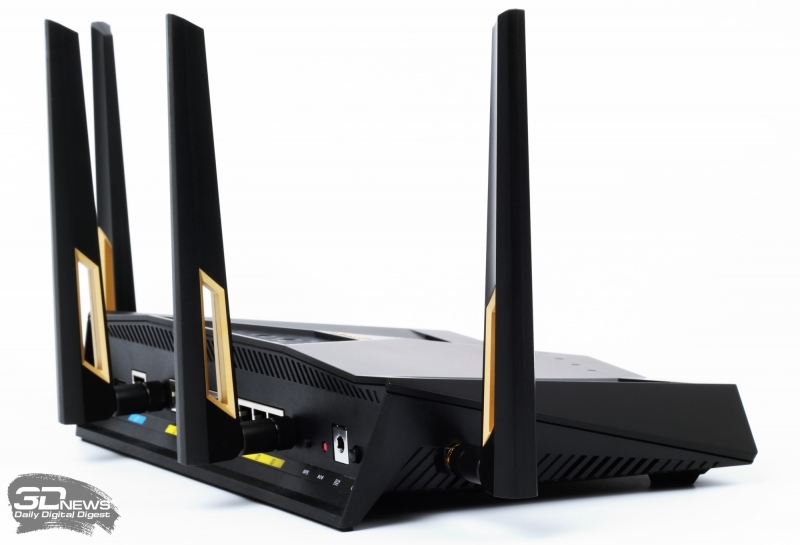
In all other aspects of ASUS RT-AX88U repeats the older model SOHO-routers of this manufacturer and stuffing (she then really powerful), and functionality. The only unknown in this equation - the price. Abroad, this model costs about $350 or € 350 - depending on the region. How much it will cost us, taking into account taxes and other expenses, It's not clear yet. However, for lovers of the most modern technologies, and wherein the device is designed, the cost is unlikely to be a decisive factor when buying.
A source: https://3dnews.ru/981287/obzor-marshrutizatora-asus-rtax88u-perviy-router-s-wifi-6












